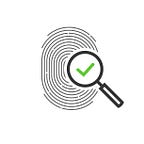Conducting Successful Remote Interviews
When the pandemic first shut down the office and sent our unit to work from home, we thought the situation was temporary. Now, here we are a few years later, and many Covid-era work practices seem to be here to stay. I remember early discussions with executive management and my investigative division about what obstacles remote work would present. The answer was unanimous: How will we conduct effective interviews (and interrogations) over the internet? While this change undoubtedly pushed the limits of our previous interviewing skills, here we are a few years later, still conducting remote interviews and still closing cases with successful criminal prosecutions and civil litigations.
What are some recommendations for conducting remote interviews?
Know how to use your platform.
Whether you’re using Microsoft Teams, Skype, or any other video services, be familiar with how it works. Do not go into an interview and need to do something that you have never practiced before. I’m still blown away that we are this far into remote working, and some people still don’t know how to share their screens. If that’s you, then no problem. Just have someone teach you and then confirm you know how to do that thing, so the interviewee gets the impression that you know what you are doing. Nobody needs extra distractions muddling up an important interview.
Don’t forget your preamble.
Every interview should start with basic but essential information, such as the date, time, case number, and the names of the investigator and interviewee. Your agency or employer should have information on what they would like you to include during this first part of the interview.
Your agency or employer should also decide how to identify the person you are interviewing. This criterion is essential for both video and telephonic interviews. Do you need a copy of the person’s driver’s license before your interview? Do they need to identify themselves in the preamble? Whatever your process, make sure you’re covered in case the interviewee turns out to be someone else.
Do a dry run before your interview, especially if the interviewee seems worried or intimidated by technology.
Feel free to set up a time before the interview to check out the technology. Have clear instructions in a document or email that goes out to all the people you interview. Doing this will allow the interviewee to feel more relaxed and focused on the content. Don’t forget to give them backup instructions such as a number for a phone interview or an option to interview in person.
Make sure you know how to record the interview, save the file, transfer it to your investigative file, and preserve it as an exhibit or evidence.
Take the time to learn how to handle recorded files on whatever video system you use. The time to have a learning experience is before handling a file with an actual interview. Also, having a backup of your interviews is never a bad idea.
Get them to prepare these things ahead of time before they understand the context of what you are examining.
There are benefits to conducting interviews that are unpredictable and fluid. There is also merit in helping your witness prepare for any information that might require them to conduct research or gather documents. Consider passing some of the questions to them ahead of time. Let them know these questions are essential and that the interview will likely cover additional information. There’s nothing like talking to someone for an hour and then leaving with nothing because they have to find the information.
Conduct a thorough interview, dragging a wide net.
There will be times when, weeks after an interview, you find out the witness has become a suspect. If you were smart and asked many questions, you will have likely cornered them into their original story or captured information that contradicts other evidence. Remember, the purpose of an interview is to get a person’s story on an official record. Do not be overly concerned whether a person is lying or telling the truth. They will have to deal with whatever they told you as the case progresses and more information and evidence comes to light.
I hope the information outlined in this article on remote interviews inspires confidence when using the remote interview as a tool. It is empowering to understand the drawbacks, recommendations, and advantages of this tool so you can add it to your investigator toolbox. Armed with this information, we should all realize that remote interviews are not better or worse; they are just different. However we feel about remote interviews, they are here to stay, and as professionals, we should develop and master this critical skill.
Originally published at https://www.investigator.today on February 25, 2022.
